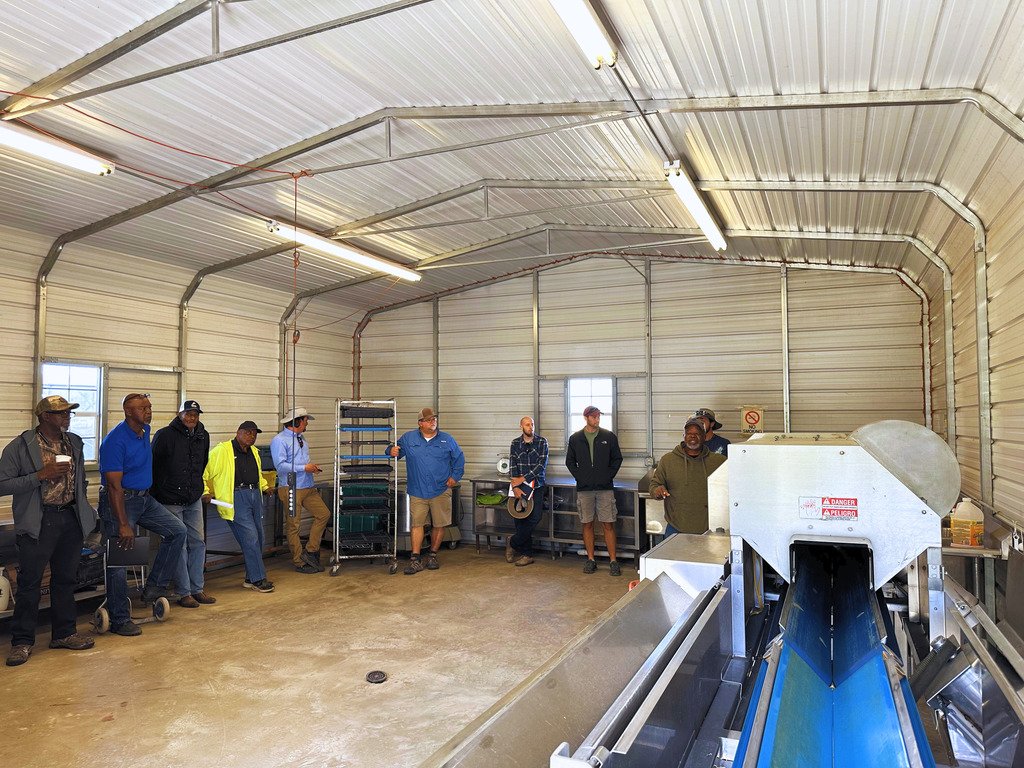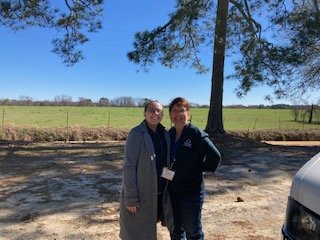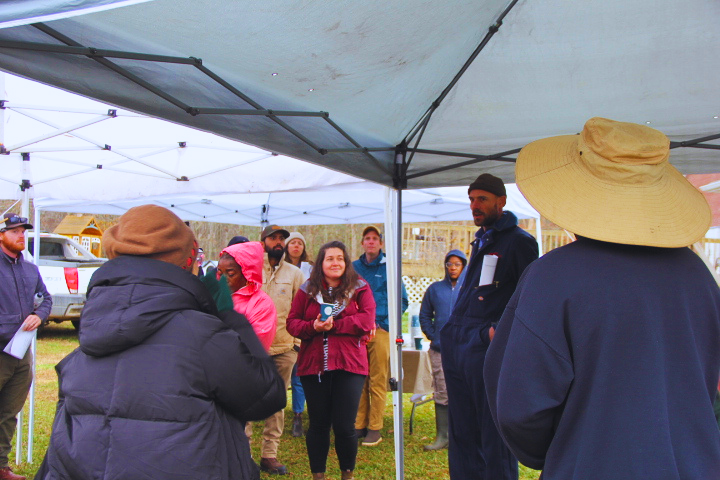By Kimberly Koogler, with contributions from Ben Sterling, Meg Darnell, and Lauren Cox
Kimberly Koogler is Georgia Organics’ Community Collaborations Manager, Lauren Cox is the Farmer Services Director, and Meg Darnell is a Farmer Services Coordinator. Ben Sterling is McIntosh SEED’s Program Manager.
Everyone gathered in the Coastal GA Small Farmers Cooperative. Photo by Lauren Cox.
In mid-April, when spring was still feeling like spring and not yet like summer, the Georgia Organics Farmer Services and Community Collaborations teams and McIntosh SEED brought a group of about 30 Southeast GA farmers together at the Coastal GA Small Farmers Cooperative in Glennville, GA for a full farmer field day all about conservation programs and crop rotation systems. Georgia Organics has been making concerted efforts to engage farms outside of the metro-Atlanta area, and this instance proved to be even more successful and rewarding than we could have hoped.
Coastal GA Small Farmers Cooperative tour. Photo by Meg Darnell.
Ben Sterling of McIntosh SEED speaking at the Coastal GA Small Farmers Cooperative. (Left to right) Kimberly Koogler and Meg Darnell of Georgia Organics. Photo by Lauren Cox.
Our gracious hosts at the Coastal GA Small Farmers Cooperative gave us a tour of their farm and facilities and shared with us the history of their Cooperative, their process for getting Good Agricultural Practices (GAP) certified, as well as their hopes and concerns about there being young people to take over operations and keep the Cooperative running and consistently producing and selling.
Coastal GA Small Farmers Cooperative processing facilities. Photo by Lauren Cox.
Everyone partook in a delicious lunch catered by local restaurant Sho’ Nuff Smokin’ Good BBQ. While folks ate, Farmer Services Director Lauren Cox went over the tiers of farmer services available to growers through Georgia Organics; Meg Darnell of Georgia Organics and Ben Sterling of McIntosh SEED introduced an exciting, new Climate Smart Farmer Program available to Black growers in Southeast GA through funding that the two organizations just received from Drawdown Georgia; Connie Oliver of WayGreen presented about the Family Farm Share program, what it currently looks like in Waycross, and their need for more growers as they expand into neighboring counties; and Mr. Charlie Grace of NRCS explained and answered growers’ questions about NRCS programs and services.
Daniel Parson of Oxford Farm at Emory presenting at the Coastal GA Small Farmers Cooperative. Photo by Lauren.
To finish out the day, Daniel Parson of Oxford Farm at Emory University presented a crop rotation workshop in which he provided a tried-and-true crop rotation system for growers to use on their own farms. Each farm also received a certified scale, a soil testing probe, a crop rotation guidebook for organic farms, and two rolls of 83”x250’ Agribon-30 row cover to take back to their farms.
Key takeaways from this gathering:
Two communities of growers from the region came together to learn about things that can help all of their unique farming operations.
This gathering was rich in diversity of farms and people in terms of race, age (small children to 80+ were involved), diversity of crops grown and held certifications, and backgrounds of farms (homesteaders to generational farming).
NRCS representative, Charlie Grace was able to provide a level of transparency that some farmers had not yet been exposed to about NRCS programs.
Networking of farms in the Southeast is said to be “rare”, according to a couple of farmers in attendance, and they seem to be hungry for more of it. In other words, more opportunities like this, please!
The crop rotation workshop gave context to and details about the importance of and science behind participating in this conservation practice.
The participants went home with many valuable supplies, including Agribon row cover, soil testing probes, certified scales, and crop rotation guidebooks.
The Coastal GA Small Farmers Cooperative, of which Common Market Southeast is currently a customer, strives for consistency and quality in all of their products, which include collard greens, squash and zucchini, peas, melons, and more. Their growers recognize a need for young people to join as they head into the future.
Sho’ Nuff Smokin’ Good BBQ sho’ nuff makes some smokin’ good BBQ!
To learn more about McIntosh SEED, visit mcintoshseed.org or follow them on Facebook facebook.com/mcintosh.seed.5 and Instagram @mcintoshseed.
To learn more about Georgia Organics visit georgiaorganics.org or follow us on Facebook, Instagram, Twitter, LinkedIn, and YouTube by searching (Georgia Organics).






























































